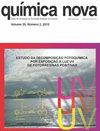CAFÉ COM QUIMIOMETRIA: UMA APLICAÇÃO DO PLANEJAMENTO FATORIAL FRACIONÁRIO 25-1
IF 0.5
4区 化学
Q4 CHEMISTRY, MULTIDISCIPLINARY
引用次数: 0
Abstract
COFFEE WITH CHEMOMETRIC: AN APPLICATION OF 25-1 FRACTIONAL FACTORIAL DESIGN. Chemometrics is a subfield of chemistry that emerged from advances in analytical instrumentation and computing. When seeking to solve chemical problems that depend on many concomitants experimental variables, chemometrics can be employed in order to extract as much information as possible in the least possible number of experiments. In addition, it is possible to evaluate the important effects and interactions among the variables to understand the processes being monitored in each system. In this sense, this article aimed to develop a didactic experiment of caffeine extraction using an espresso machine, applying the 25-1 fractional factorial design. The variables studied were temperature (75 and 78 ºC), pressure (2 and 15 bar), granulation (bean and ground), type of coffee (special and traditional) and period of the day (morning and afternoon) to obtain maximum extraction of caffeine. The coffee extracts obtained were analyzed using UV-Vis molecular absorption spectrophotometry. The developed experiment showed the potential to spread the application of chemometrics in the academic environment and to facilitate the teaching of fractional factorial design.化学计量学咖啡:分数因子设计25-1的应用
咖啡化学计量学:25-1分数因子设计的应用。化学计量学是化学的一个子领域,是由分析仪器和计算的进步而产生的。当寻求解决依赖于许多伴随的实验变量的化学问题时,可以使用化学计量学,以便在尽可能少的实验中提取尽可能多的信息。此外,还可以评估变量之间的重要影响和相互作用,以了解每个系统中被监测的过程。在这个意义上,本文旨在开发一个教学实验咖啡因提取使用浓缩咖啡机,应用25-1分数因子设计。研究的变量包括温度(75和78ºC)、压力(2和15 bar)、颗粒化(咖啡豆和研磨)、咖啡类型(特殊和传统)以及一天中的时间段(上午和下午),以获得最大的咖啡因提取。采用紫外-可见分子吸收分光光度法对所得咖啡提取物进行分析。开发的实验显示了在学术环境中推广化学计量学应用的潜力,并促进了分数因子设计的教学。
本文章由计算机程序翻译,如有差异,请以英文原文为准。
求助全文
约1分钟内获得全文
求助全文
来源期刊

Quimica Nova
化学-化学综合
CiteScore
1.60
自引率
12.50%
发文量
72
审稿时长
2-4 weeks
期刊介绍:
Química Nova publishes in portuguese, spanish and english, original research articles, revisions, technical notes and articles about education in chemistry. All the manuscripts submitted to QN are evaluated by, at least, two reviewers (from Brazil and abroad) of recognized expertise in the field of chemistry involved in the manuscript. The Editorial Council can be eventually asked to review manuscripts. Editors are responsible for the final edition of QN.
 求助内容:
求助内容: 应助结果提醒方式:
应助结果提醒方式:


